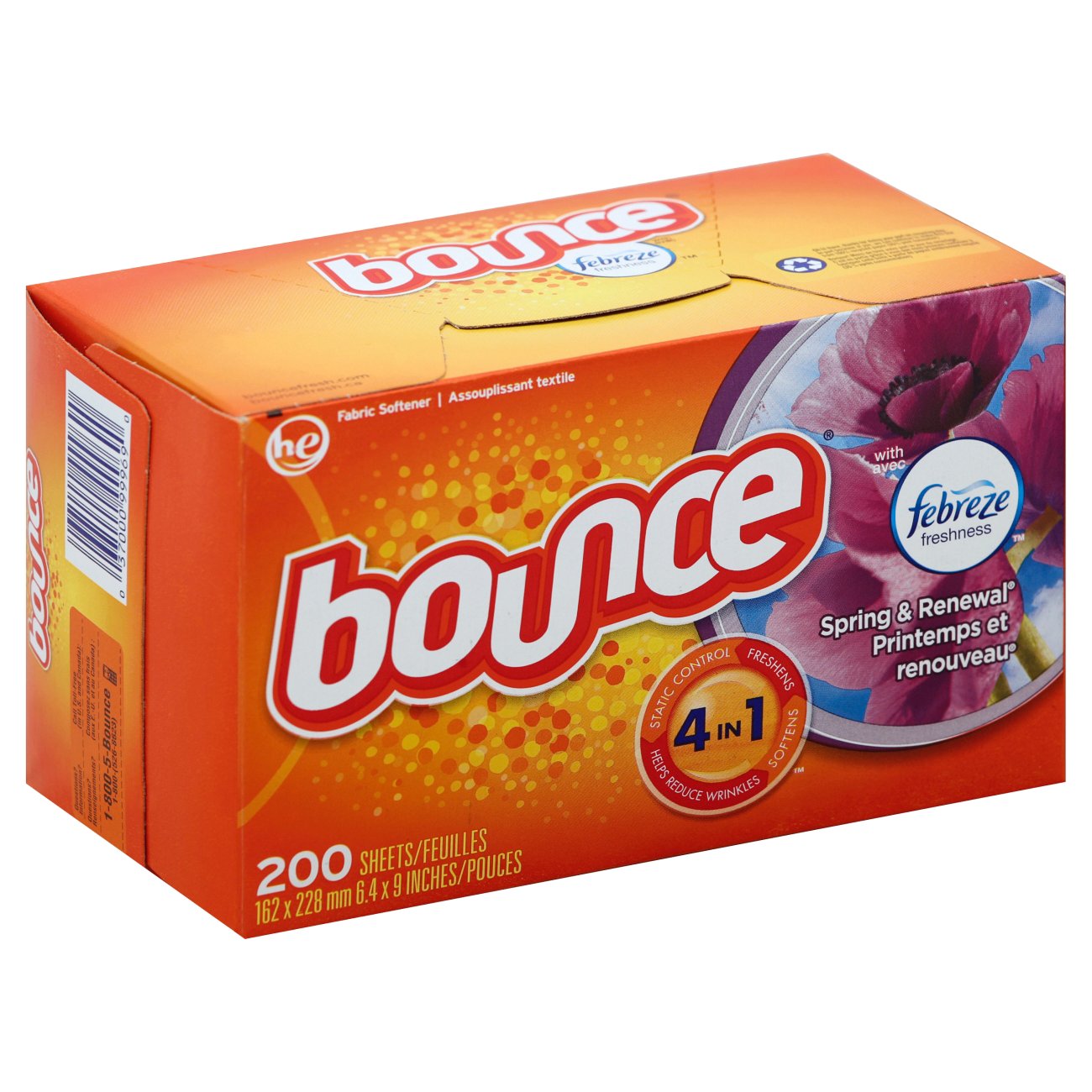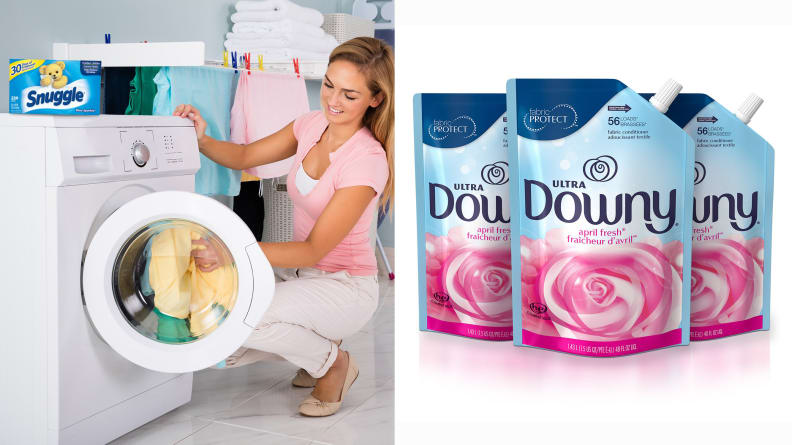Decisions, decisions! When it comes to dryer sheets vs fabric softener, which should you go for?
Both are designed to soften clothes, reduce static and wrinkles, and freshen your clothes.
Downy ® Downy Fabric Softener Sheets go in the dryer to add even more softness, freshness, and static protection to your laundry. And when it comes to making your clothes comfortable, more is definitely better.
In this post, we’ll discuss the key differences to hopefully help you make a decision.
#8 – Fabric softeners and dryer sheets should not be used with flame-retardant fabrics (like children’s clothing). The ingredients in liquid fabric softeners and dryer sheets apply a thin, waxy coating to all fabrics — thereby reducing the flame resistance of fabrics which have been treated with a flame retardant. Best Unscented: Seventh Generation Fabric Softener Sheets, Free and Clear Buy on Amazon Buy on Walmart A whopping 97 percent of the ingredients in these dryer sheets are plant-based, and they're.
What Do Dryer Sheets and Fabric Softener Do?
Dryer sheets and fabric softeners can scent and soften clothes and reduce static. Place dryer sheets on top of your clothes in the dryer and dispose of them afterward. Fabric softener is used with your detergent during the wash cycle. Dryer sheets are cheaper and slightly easier to use, but fabric softener may have more benefits.
What Does Fabric Softener Do?
Fabric softener has key benefits, all which make it so popular in many households.
- It scents your clothes. Fabric softener comes in lots of different scents, so you can find one you love.
- It reduces static.
- It can reduce wrinkles.
- It softens your clothes so they don’t come out stiff and hard.
- Some softeners can protect your clothes from stretching, fading and pilling.
Is Fabric Softener Always Necessary?
Fabric softener is not always necessary. Some people skip using it entirely in their laundry routine. But even if you are a devoted fabric softener user, there are times when you should absolutely not use it.
When Not to Use Fabric Softener
- Don’t use fabric softener on towels. It can reduce their absorbency which defeats the towel’s purpose (1).
- Like towels, don’t use fabric softener on microfiber or water-resistant garments. Gym clothes need to absorb your sweat and odors, and fabric softener can reduce this ability.
- Don’t use it on flameproof clothes or pajamas as it can wear down this ability.
- Skip the fabric softener on any synthetic clothes.
- Don’t use fabric softener on baby clothes. First, baby clothes tend to be flameproof. Second, babies have sensitive skin and fabric softener often contains harsh chemicals (2).
Pros and Cons of Using Fabric Softener
If you’re unsure about fabric softener, here are some of the main pros and cons.
- It keeps fabrics soft.
- It can reduce wrinkles.
- It reduces static.
- It can protect garments from vigorously rubbing against each other and wearing down.
- It adds fragrance.
- They work alongside detergent.
- There are some plant-based options.
- Fabric softener is made with harsh chemicals that can irritate your skin and cause respiratory problems (3).
- It can wear down wicking and flameproof abilities on clothes.
- Fabric softener can build up on your clothes.
- It’s harmful to the environment (4).
What Do Dryer Sheets Do?
Dryer sheets are a popular alternative to fabric softener. Unlike fabric softener, however, they go in the tumble dryer, not the washing machine. Add them to the top of your laundry before starting the cycle. Here are a few things dryer sheets can do.
- They prevent static build-up: Dryer sheets, like fabric softener, prevent static build-up.
- They freshen clothes: Dryer sheets come scented and unscented. Scented sheets can freshen your clothes. Some dryer sheets come with an ability to fight odors, rather than just mask them.
- They soften your clothes: Dryer sheets are made with fabric softening agents, such as fatty acids. The heat in your dryer spreads the softener across your clothes so they come out lush.
- Multiple other uses: You can use dryer sheets outside the laundry for dusting, cleaning your iron and freshening up your closet.
When Not to Use Dryer Sheets
Because dryer sheets are made similarly to fabric softener, you’ll want to avoid using them on the same fabrics.
- Don’t use dryer sheets on towels as this can reduce the absorbency.
- Don’t use on microfiber, water-resistant or gym clothes as this can also reduce the absorbance ability.
- Don’t use on flameproof clothes or pajamas.
- Don’t use on synthetic clothes unless the packaging instructions allow it. If so, use a low heat cycle.
- Don’t use them on baby clothes as this can reduce flameproof ability. Plus, babies have sensitive skin and dryer sheets still contain harsh chemicals.
Pros and Cons of Using Dryer Sheets
There are pros and cons to using dryer sheets. So before you buy some, check out this list.
- Easy to use. No need to pre-measure anything out, like fabric softener.
- They scent your clothes.
- Affordable.
- They soften your clothes.
- They reduce static cling.
- Can reduce wrinkles.
- They coat the clothing and can build up on your clothes.
- Dryer sheets contain harsh chemicals that can cause respiratory and skin irritation.
- They are not reusable, though some are compostable.
- They reduce the absorbency and flameproof ability of garments.
Fabric Softener vs Dryer Sheets
In summary, fabric softener and dryer sheets both soften clothes, reduce static and wrinkles, while adding fragrance.
However, both dryer sheets and fabric softeners contain some harsh chemicals. These chemicals can cause headaches, asthma attacks, and skin irritation.
Your Choice
Let’s compare some of the characteristics of both fabric softener and dryer sheets. Please note that every brand is different, so perhaps not all of these characteristics can be found in one product.
For example, if we say “sometimes” — then that is a unique characteristic found in a handful of products, rather than being a common trait.
| Function | Fabric Softener | Dryer Sheets |
| Prevents stretching, fading and pilling | Yes | No |
| Scent | Yes | Yes |
| Softens fabric | Yes | Yes |
| Fights static | Yes | Yes |
| Reduces wrinkles | Yes | Sometimes |
| Fights odors | Sometimes | Sometimes |
| Packaging | Plastic bottle | Cardboard box |
| Toxic chemicals | Yes | Yes |
| Price | $$ | $ |
Fabric Softener Alternatives

If you don’t like the sound of fabric softener, there are some effective alternatives you can try. Alternatively, you can look for a more natural option.
- Baking soda: Add ½ cup of baking soda to your detergent dispenser or your drum before washing clothes.
- White vinegar: Add ½ cup of distilled white vinegar to the fabric softener dispenser at the beginning of the cycle.
- DIY fabric softener: Make a homemade fabric softener recipe. Mix together two cups of Epsom salts, ½ cup of baking soda, and 40 drops of essential oil. Add two or three tablespoons to the rinse cycle of your laundry load.
Or, Just Skip the Softener
Dryer Sheet Alternatives
Likewise, there are many less toxic, reusable dryer sheet alternatives.
- Dryer balls: Dryer balls are very popular now and have the same effect as dryer sheets but without the chemicals. Plus, they’re reusable.
- Aluminum foil: Scrunch up a baseball-sized bit of aluminum foil and add it to the dryer cycle to fluff up and soften your clothes.
- Air drying your clothes outside: This can reduce static and wrinkles as well as adding freshness.
Choices, Choices
Baby Fabric Softener Vs Dryer Sheets
When stuck between dryer sheets and fabric softener, it’s down to personal preference. Dryer sheets are easier to use and slightly cheaper, but fabric softener might have more benefits, depending on the brand you choose.

However, both products contain harsh chemicals so we recommend you check out some of our alternative options. Or go wild, and do laundry without either of these products!
Fabric softeners. They keep your clothes feeling soft and static free. And, many enjoy breathing in their fresh scent.
But, what exactly is the difference between the two types of softeners, and is one a better alternative than the other?
How does fabric softener work?
Both fabric softeners and dryer sheets help eliminate static and wrinkles while making clothes feel softer and smell better. However, they work in different ways.
Liquid fabric softener is added to the wash cycle and permeates into fabric fibers. In addition to other benefits, liquid fabric softeners may also keep clothes from stretching, fading and accumulating fuzz.
However, liquid fabric softeners may stain clothes because they are made from oil. They also can build up in a washing machine’s dispenser, requiring frequent cleaning. If you are not using a dispenser or a softener ball, make sure to add liquid softener during the final rinse when the tub is full of water to avoid staining.

Dryer sheets reduce static and increase the cottony feel of fabrics. Dryer sheets are coated with stearic acid, which melts in the dryer and coats clothes to provide these benefits. In some cases, staining also has been reported, so do not overfill your dryer, and place the dryer sheet on top of the clothes after loading the dryer.
When not to use softeners
Liquid Vs Sheet Fabric Softener
Because softeners essentially coat fabrics, there are a few laundry items that should not be exposed to softeners:
- Microfiber clothes: Using softeners may damage the fabric’s ability to trap dust and absorb spills.
- Athletic sportswear: Softeners’ coating may lessen this fabric’s “wicking” ability, lessening the chance you’ll feel cooler during your workout.
- Children’s clothing: Manufacturers are required to make children’s sleepwear flame resistant. Softeners will lessen this resistance, so softeners should never be used on children’s sleepwear.
- Towels: Although the feeling of a soft, fresh-smelling towel is welcome, softeners can reduce a towel’s ability to absorb water.
Fabric softener alternatives

Because of these and other concerns with fabric softeners, some people have tried alternatives with some success.
White vinegar does not always reduce static, but it has been found to soften clothes (and as a bonus, it does not leave a vinegar smell). Like liquid fabric softener, add one-half cup (for a large load) of white vinegar to the rinse cycle when the tub is full of water to avoid bleaching and a vinegar smell.
Aluminum foil dryer balls help reduce static but do not get clothes as soft as dryer sheets. Make three-inch balls out of aluminum foil and toss them in the dryer. As the foil becomes smooth, add more foil or replace the balls with new ones.
RELATED POSTS
Fabric Softener Dryer Sheets Walmart
Fabric Softener Vs Dryer Sheets Reddit
